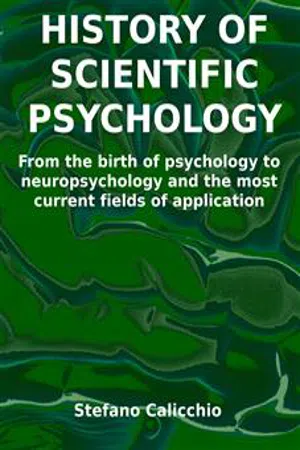
History of scientific psychology
From the birth of psychology to neuropsychology and the most current fields of application
- English
- ePUB (mobile friendly)
- Available on iOS & Android
History of scientific psychology
From the birth of psychology to neuropsychology and the most current fields of application
About This Book
Discovering the history of psychology and its application areas has never been easier. This volume reviews the main currents of thought that have characterized the birth and evolution of scientific psychology. From the first laboratories of psychology to psychodynamic theory, from cognitivism to neuroscience, the first part of this guide takes you by the hand and accompanies you among the most important discoveries of the subject. The second part of the volume is dedicated to the discovery of clinical psychology, work, legal, development and the various fields of application of the subject. All this through a simple, fast and essential style of discourse. The book ends with a small self-assessment test that allows the reader to review and fix the main concepts. Forget the thousands of pages long or prohibitively expensive psychology manuals and start exploring how your mind works through a series of guides at unbeatable prices. ### THE COLLECTION ###
Psychology made simple is a collection of simple, clear and ready-to-use texts dedicated to the functioning of the human mind, whose lowest common denominator is the practicality and immediacy of its contents. From work contexts to family life, from relationships with others in search of a personal balance, everyone will be able to find answers and satisfy their desire to know, without trespassing into more complex treatments than necessary.
Frequently asked questions
Information
Table of contents
- Disclaimer
- Introduction
- The precursors of matter
- Scientific psychology
- Associationism and structuralism
- Functionalism
- Gestalt Theory
- Behaviorism
- The psychoanalytic revolution
- Cognitivism
- Evolutionary psychology
- Neuroscience
- Areas of application of psychology
- Clinical Psychology
- Legal psychology
- Occupational Psychology
- Educational psychology
- Developmental psychology
- Conclusion
- Self-assessment test
- Solutions
Disclaimer
Introduction
The precursors of matter
Table of contents
- Cover
- HISTORY OF SCIENTIFIC PSYCHOLOGY. From the birth of psychology to neuropsychology and the most current fields of application.
- Table of contents
- Disclaimer
- Introduction
- The precursors of matter
- Scientific psychology
- Associationism and structuralism
- Functionalism
- Gestalt Theory
- Behaviorism
- The psychoanalytic revolution
- Cognitivism
- Evolutionary psychology
- Neuroscience
- Areas of application of psychology
- Clinical Psychology
- Legal psychology
- Occupational Psychology
- Educational psychology
- Developmental psychology
- Conclusion
- Self-assessment test
- Solutions